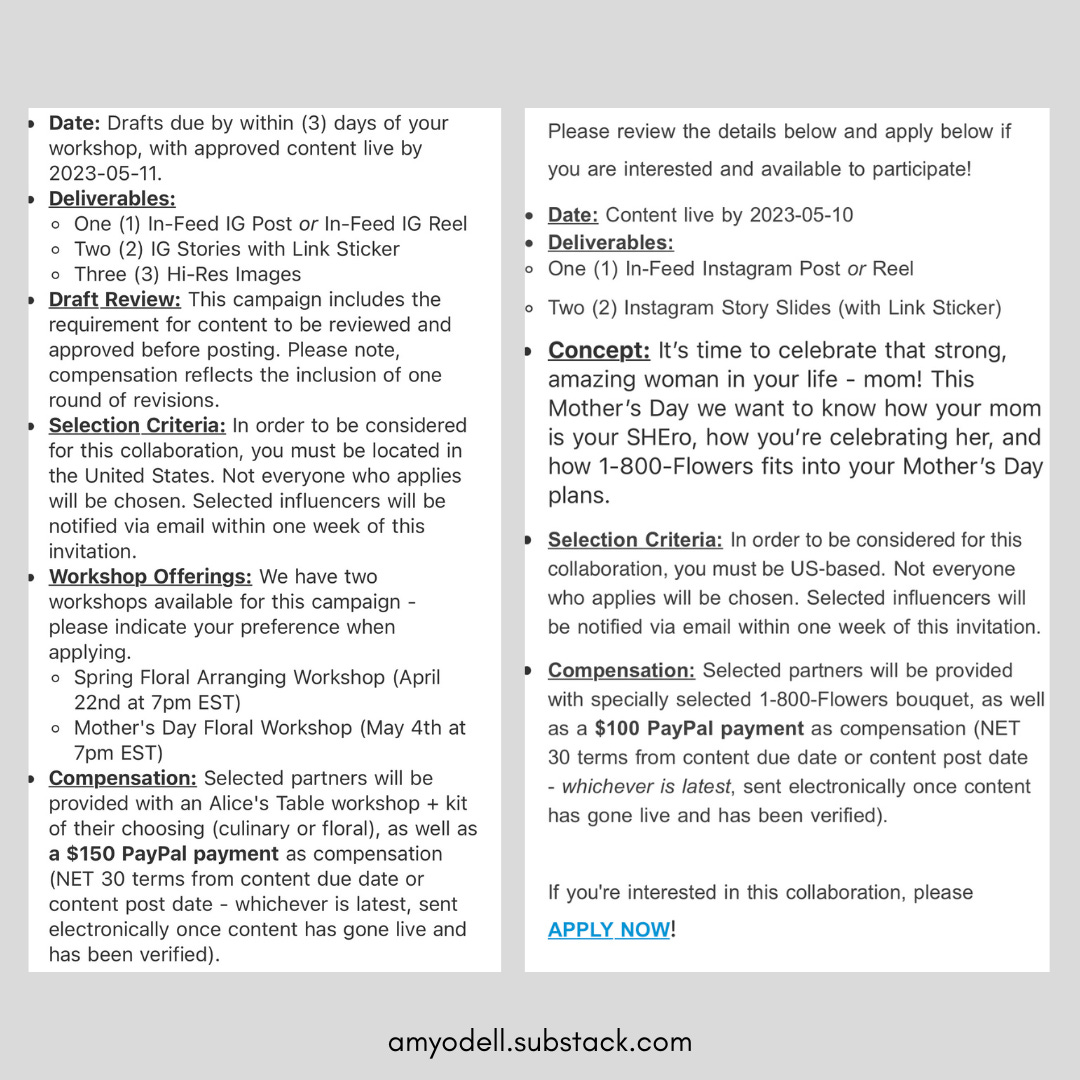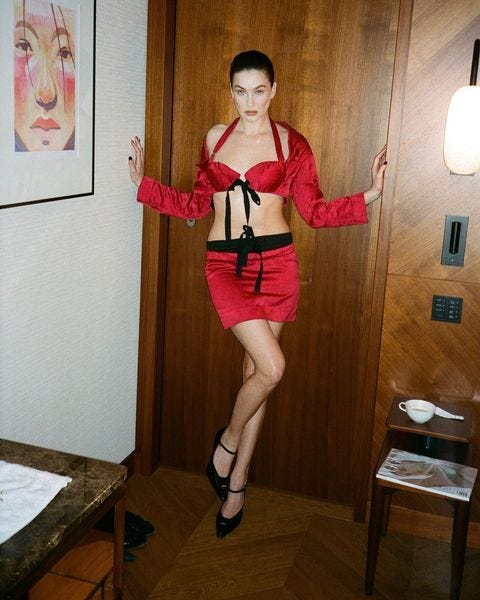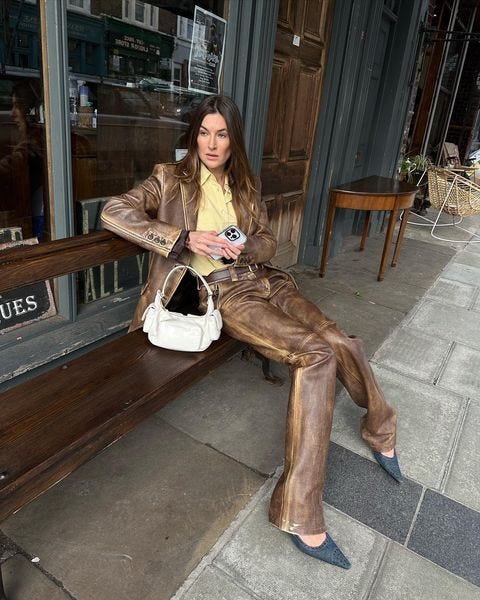Influencers Talk Honestly About How They Earn Money: Part 1
"My deals are always over £10,000 ($12,440). There is no standard."
Complaining about influencers in 2023 feels like longing for the days of cable TV. Despite the media’s ongoing snark toward content creators and many proclamations that influencing is dead, the industry continues to boom. According to Influencer Marketing Hub, the influencer marketing industry is expected to be worth $21.1 billion this year, up from $16.4 billion in 2022, and $1.7 billion in 2016. Meanwhile, Retail Touchpoints reports that 68 percent of brands expect to increase influencer marketing budgets this year.
That said, influencing can still feel like the Wild West. The industry is subject to the whims of platforms and their algorithm changes, meaning one minute Instagram #ootd girls are popular, the next minute brands want something else entirely from TikTok. Rates are not standardized across the industry, with the discrimination we see in the workplace generally applying to influencing, too. An Influencer Marketing Hub survey found that nearly 60 percent of influencers felt they’d been discriminated against:
When asked to highlight an area of discrimination the respondents felt they had faced, 47.73% believed they had suffered from gender discrimination. Physical feature discrimination (21.75%) followed this, then racial discrimination (13.29%), political discrimination (9.06%), and sexual discrimination (8.16%).
While influencing has never been valued at a higher premium, it has also perhaps never been so undervalued, as evidenced by the emails I get each week asking me to apply for jobs paying around $100 or $150 with a whole litany of requirements.
In the interest of knowledge-sharing, I started interviewing influencers/content creators (I use these terms interchangeably) about how they earn money. These interviews will roll out in two more installments after today’s.
My overall takeaways from the series:
A lot of influencers really want to be writers. But writing doesn’t pay. Many have editorial experience at legacy publications and say influencing isn’t the most stable job ever, but can feel a lot more stable than media #grim.
If you have a massive following, this work can be quite lucrative. You’ll hear from one creator in this series who earns seven figures some years.
You get out of your content what you put into it. The more you post, the more work you put in, the better you’re likely to do. (I’ve personally found this to be true with both social media and Substack.)
You will probably not make real money from your content for the first few years.
Some creators have found lucrative ways to monetize their platforms outside of sponsored content. For instance, some use the clout they earn as influencers to get well-paying consulting contracts.
Ahead, influencers explain how they earn money. Interviews have been edited and condensed.
Camille Charrière
Instagram following: 1.4M
TikTok following: 57.2K
Has been a content creator since 2010.
Has been a full-time content creator since 2013.
Fee per deal: £10,000 ($12,440) and up.
I studied law and then worked in finance for a while in London. I needed a creative outlet. I created my blog around 2011 because I saw other people doing it. That evolved very quickly into something that was earning more money than my corporate job.
Even back then, the money that you could make from this was surprisingly high. Quickly I was out-earning a lot of my friends I went to school with.
My first Instagram, I remember I was in the office at my hedge fund job and I posted my McDonald’s meal for lunch. I primarily used it to attract traffic to my blog and it grew quickly.
One of my first deals was an H&M video for their YouTube channel. I got invited to New York Fashion Week with Mango. These deals were probably around £1,000, £2,000, not life-changing amounts. There was a lot more trust then. Now, brands who are paying a lot of money want to see results and have briefs and hashtags and mood boards and a whole list of what you can’t do. It’s a lot of work. If a brand is not happy, they’re going to make you redo it.
After I left my job in finance, I got a job at Net-a-Porter using my blog as a CV. I took a pay cut to work there. After around a year I got poached by Matches because I had a large following – more than Matches at the time. Within a few months they turned around and said I could no longer post my own content on my page and that now I had to focus on doing stuff for Matches. I was a bit shocked. I chose the blog. I’m not going to pretend the choice was easy. I don’t come from a family with connections or money.
Through my content, I was making more than £24,000 a year – my Matches salary – through affiliate links and paid projects. It was enough to get a small flat share in London and survive. I couldn’t afford much, I was walking everywhere. Working in fashion in London is not very compatible unless you’ve got someone to buy you everything.
Then Sarah Mower wrote an article about French girls living in London for Vogue and used me as a poster child for it. When Vogue touches you, especially back when influencers were not quite part of the industry, a lot more brands wanted to work with me.
Being an influencer came with perks. You were getting invited to things like Coachella, so even though I wasn’t paid for the trips, I was getting a lifestyle that I would not be able to enjoy if I was working a corporate job. I’ve lived in 12 different places in London since I got here 10 years ago, just going from flat-share to flat-share. It took a long time to earn enough to be in a nice situation, but that’s what you do when you’re younger in London.
I’ve worked with several agencies, like IMG and Next, but I just hired someone in-house. I see a lot of agents kind of doing the same thing that they do with models, which is basically selling you as an interchangeable almost package deal — “if you don’t want this one, you might want this one” — which I don’t think is how you build a career.
Now, I can say no to things because I’m the one calling the shots, I don’t have someone pushing me. I’m a contributing editor at Elle UK now and obviously that makes no money at all. I’m saying no to a lot of big money jobs to be able to do that but that’s what interests me.
It’s difficult to walk away from influencing because it would mean a huge pay cut. I don’t think there should be this much of a discrepancy — why is writing so undervalued versus taking a picture? I’m trying to write a book at the moment. The way I’ve gone about it is to do fewer deals but pick brands that want to work across several months.
My deals are always over £10,000 ($12,440). There is no standard, each relationship with each brand is different. When my manager gets a request, she’s going to have a benchmark of what a story costs, a post costs, a TikTok costs.
It’s been really nice not to worry about money as much. I made a good amount last year because I did a capsule collection with Mango and had a big international launch. Money has not gone down since the pandemic, it’s been growing solidly since I started my career. There’s never been a year that I haven’t done better than I did before.
I easily make more than £500,000 a year influencing.
Keep reading with a 7-day free trial
Subscribe to Back Row to keep reading this post and get 7 days of free access to the full post archives.







